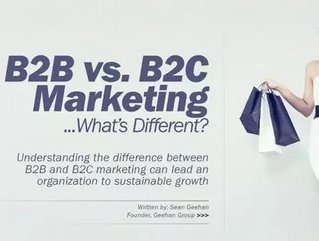B2B vs. B2C Marketing...What's Different

Written by: Sean Geehan, Founder, Geehan Group
CEOs and leaders alike need to understand the differences between B2B and B2C worlds. Many marketing leaders have a difficult time making the much-needed adjustments to be successful when they move from a B2C to a B2B organization. Understanding the differences is essential to yielding predictable results.
I’m a living case-in-point. I drink more Diet Coke than I do anything else. I have it stocked in my home fridge, in my work fridge, and I order it every day at lunch. The image of the Coke brand, for me as the customer, is defined entirely by the advertising, package design, and my experience with the taste. I have no personal relationship or connection with the organization itself, and yet I am entirely loyal to that brand. If the package is damaged, I assume my local grocer dropped it while putting it on the shelf. If it doesn’t taste right in a restaurant, I assume the restaurant messed it up.
B2C companies invest millions to understand the various personas, segments, demographics, and geographical nuances of their customers to help them determine how to position and manage their brands to appeal to the masses. In the retail category (e.g., Starbucks, Disney, Target), the brand is also impacted by elements such as the store itself (look, experience) and the people within (knowledge, culture, and interactions). B2B companies invest to understand their customers as well, but the path they take must be very different.
While the fundamentals of marketing are universal, there are three key factors that require a different application in the B2B arena. They are:
- Number of customers — B2C firms usually have 100 to 1,000 times as many customers for a similar amount of revenue. Williams Sonoma has 33 million customers with $3 Billion in revenue, while HCL has the same revenue, but fewer than 500 customers.
- Multiple buying levels within a B2B customer — In my Coke example above, I am the sole person involved in the buying process. In the B2B world, there are typically three levels involved (users, influencers, and decision makers), and each level may have 1 to 1,000s of people, all of whom may impact the purchasing process.
- Domain knowledge — The B2B buyer has the expertise and experience in the offering being considered. Think about the Boeing Engineer evaluating a GE jet engine for a new airplane…a CIO evaluating a new IT provider…or a CFO reviewing audit firms. Each has a level of expertise that most consumers do not have. Let’s face it, how many wine drinkers can really distinguish between a $10 vs. $100 bottle of wine?
Understanding the key differences between the B2B and B2C worlds and applying the appropriate approaches will boost the overall ROI of marketing efforts and ultimately propel an organization toward sustainable, predictable, and profitable growth.
About the Author
Sean Geehan is Author of The B2B Executive Playbook and founder of Geehan Group, the premier thought leader in and provider of Customer Advisory Board research, services, and methodology. Sean can be reached at [email protected] or 937.271.3914.






